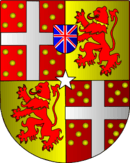Duke of Victoria
Duke of Victoria (Portuguese: Duque da Vitória;[1] literally translated as Duke of the Victory) is a Portuguese title of nobility retained by the Duke of Wellington.
| Duke of Victoria Duque da Vitória | |
|---|---|
  Arms of the Dukes of Wellington as Duke of Victoria. | |
| Creation date | 18 December 1812 |
| Monarch | Prince Regent John of Portugal (later King John VI) |
| Peerage | peerage of Portugal |
| First holder | Arthur Wellesley, 1st Marquess of Wellington |
| Present holder | Charles Wellesley, 9th Duke of Wellington |
| Heir apparent | Arthur Wellesley, Earl of Mornington |
| Remainder to | the 1st Duke's heirs male of the body lawfully begotten |
| Subsidiary titles | Marquis of Torres Vedras Count of Vimeiro |
The title was created by Prince Regent John of Portugal (later King John VI) on 18 December 1812 to honour the British General Arthur Wellesley, who was the general commander of the armies that eventually defeated the troops of Emperor Napoleon I of France in the Peninsular War. It is the only time that a Portuguese dukedom was granted to a foreigner.
Arthur Wellesley had already received the Portuguese titles Conde de Vimeiro (Count of Vimeiro, 18 October 1811) and Marquês de Torres Vedras (Marquis of Torres Vedras, August 1812), which became subsidiary titles to that of Duque da Vitória. He also received the British peerage title Duke of Wellington, that in addition to other titles and honours from the United Kingdom, Spain and Netherlands. All these titles were passed to his heirs until the present day.
Dukes of Victoria since 1812
- Arthur Wellesley, 1st Duke of Victoria (1769–1852) from 1812
- Arthur Richard Wellesley, 2nd Duke of Victoria (1807–1884) from 1852
- Henry Wellesley, 3rd Duke of Victoria (1846–1900) from 1884
- Arthur Charles Wellesley, 4th Duke of Victoria (1849–1934) from 1900 until 1934
- Arthur Charles Wellesley, 5th Duke of Victoria (1876–1941) from 1934
- Henry Valerian George Wellesley, 6th Duke of Victoria (1912–1943) from 1941
- Gerald Wellesley, 7th Duke of Victoria (1885–1972) from 1943
- Arthur Valerian Wellesley, 8th Duke of Victoria (1915–2014) from 1972
- Arthur Charles Valerian Wellesley, 9th Duke of Victoria (b. 1945) since 2014
The heir apparent is the present holder's son Arthur Gerald Wellesley, whose heir apparent is his son Arthur Darcy Wellesley.
Use of titles of nobility in the Portuguese Republic
With the end of the Portuguese monarchy in 1910, all titles of Portuguese nobility were initially abolished. Notwithstanding, although the status of nobility has not been recognised in law since 1910, legitimate titles of nobility (those granted by a reigning monarch before the 5th October 1910) have been given legal recognition and protection, including under article 26 of the Portuguese Constitution, in conjunction with articles 70 and 72 of the Civil Code, as established by decision of Portugal's Supreme Court of Justice in 2014.
See also
- Prins van Waterloo
- Duque de Ciudad Rodrigo